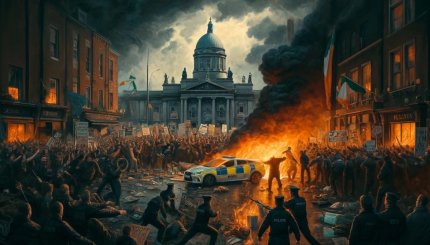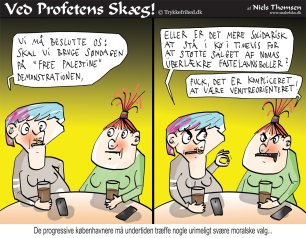Media as well as the cultural elite was in those days oftentimes against censorship and limitations of freedom of speech. That they are no more. Now medias, cultural influencers and politicians are uncritically supporting new legislation on ‘hate-speech’ – a legislation arrested time ago by the Danish Free Speech Society for being brutally and radically curbing rights of freedom of expression on the Emerald Isle. The government is still in need of approval from the senate, and consequently the political elite now cynically exploits the violent protests in Dublin in November with this in view. This unrest was caused by the knife attack of a Muslim immigrant on a woman and several children outside a school in Dublin. Subsequently parts of the local lower classes set fire on police cars shouting slogans protesting the social and criminal issues which the liberal immigration policies of the Irish government has created.
Varadkar, the Irish prime minister, held a speech immediately following the Dublin riots in favor of the limitations in freedom of expression suggested by the hate-speech law, qualifying the rioters as ‘right-wing racists’ while promising extended authority for the police to survey and punish expressions by citizens especially on social medias.
The name of the hate-speech law of the Government, being unpronounceable [1], is very fitting as an alcohol test in the pubs of Dublin while incidentally making it a crime to say or write anything which any specially selected group in the society might find hateful or offensive. This law, which does not define ‘hate-speech’, leaves it to the Irish authorities to decide whether such a punishable hate speech act has taken place. This decision must be so-called ‘perception-based’, which means to say, that any and anon who find him- or herself as being victimized by a hate-speech act is automatically entitled to be taken in earnest and a police investigation must be initialized. This law invites a flood of legal proceedings, interference by the authorities and punishments against anyone claiming e.g. that gender is biologically based or stating facts on the overrepresentation of Muslim immigrants in the criminal statistics. Almost Orwellian this law criminalizes even the possession by not published, undefined ‘hate speech’ thereby expanding the powers of those in charge to curb civilian freedom of expression. ‘Possession’ of such criminalized material could be of a provocative video stored on one’s personal computer or of a controversial text.
Authorities in Belfast too have in connection with the Dublin riots in the wake of the terror knife attack on children by the Muslim man investigated graffiti slogans like “Irish Lives Matter” as being a hate crime, - while an utterance by a Muslim member of the City Council of Limerick to the end that rioters in Dublin should ‘have a bullet in the head’ and be beaten to death is seemingly not being investigated as hate speech by Irish authorities?
As a means for those in power this law therefore serves the political object of securing a closing down of civil journalism critical of the government as well as civilian protests and critical voices against the governmental open immigration policy. It thereby unconcealed illustrates the general European tendency of associating Muslim mass immigration with simultaneous authoritarian restrictions on civic freedoms.
The Irish police incidentally initiated an investigation of claimed ‘hate speech’ against Irish Conor McGregor, former pugilist, boxer that is, as he had critically commented upon the immigration policies of the government on social medias after the knife attack in Dublin. MacGregor clearly distanced himself from the November rioters in Dublin but had expressed the need of “change” of immigration policies – being thereby subjected to police investigations.
As I last August had the opportunity to ask Tommy Robinson as to how he would explain the present policy of the Irish political elite to clamp down harshly on freedom of expression his answer was immediate: “Because they have now for two or three years flooded Ireland uncontrollably and the Irish population presently revolts and wakes up in recognition of how things will be in the future. Those in control will prevent this information from reaching the people before it is too late . . . “. And, as prophesized by Robinson, Kitty Holland, a star journalist on The Irish Times and representative of Irelands media elite, recently declared that the media henceforth – for political reasons and for the common good – should suppress news and stories about immigration violence and criminality in the country.
According to polls three out of four Irishmen are against the governmental limitations of freedom of expression. If those people do not soon organize themselves politically and peacefully and orderly protest on this development, they might not even have this democratic right at all in the future? Since all citizens are equal on the authoritarian Animal Farm in the future Ireland of Leo Varadkar – but some are more equal than others!
[1] Criminal Justice (Incitement to Violence or Hatred and Hate Offences) Bill
transl. lrb



